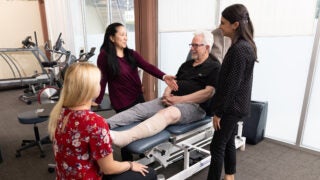El Centro Chicano celebrates 40 years
Somos uno, somos familia, somos El Centro.
These words, which translate as “We are one, we are family, we are El Centro,” express the mission of El Centro Chicano since its inception four decades ago at USC.
On Dec. 1, El Centro Chicano, part of the USC Division of Student Affairs, celebrated its 40-year anniversary at Town & Gown. More than 380 people attended the gala, which featured dinner, musical and theatrical performances, a silent auction, and two short films about the history and future of the center.
El Centro has a lot to celebrate. The university founded the center in 1972 at the request of students. What began with a handful of Latino students and the support of a few USC faculty and staff members has grown into a center that houses more than 20 Chicano and Latino student organizations and dozens of programs.
“I began here in 2005, and one of the first things that we did was try to create new things, go in a new direction, hear what the students are thinking and what their needs are now,” said Billy Vela, the center’s director. “But we didn’t want to forget about the past, about where we’ve been and what our foundation is.”
At its gala, the center acknowledged a number of milestones. In 1974, El Centro created the Latino Floor, a residential theme program in Fluor Tower for first-year students that aims to increase retention rates and ease the transition into Trojan life. The floor currently houses more than 30 students and provides cultural, academic and social activities throughout the year.
In 1979, the center moved into its current home in United University Church. A year later, the staff launched the first Chicano graduation ceremony, with fewer than 20 people in attendance. The event now draws more than 3,000 people and gives all graduates 20 seconds each to thank those who have helped with their educational journeys.
In addition to providing social and academic support to students, El Centro also reaches out to their parents.
“When I went for the first time to a USC parent orientation meeting, I didn’t see too many faces like mine,” said Nora Angulo, president of the Latino Parents Association (LPA). “So I attended an El Centro meeting, and I saw the need for parent involvement in the Latino community. For me, it’s been a great journey as a parent and as a board member. I can see how LPA is making a difference in our community.”
The LPA, founded by El Centro in 1982, is celebrating its 30th anniversary this year.
Through the years, the center has broadened its scope to include students representing all Latin American countries, the lesbian, gay, bisexual and transgender community, and multiracial students — basically anyone who walks through the center’s door.
Although Vela is proud of all the center’s programs and faculty partnerships, he names two favorites. The first is LA Power Trips, where USC faculty and staff take students off campus to learn about cultural organizations and nonprofits. The second is the Latino Speaker Series, which regularly brings prominent Latino leaders to campus to inspire students.
In addition to programs, Vela said the center’s big push is leadership development — connecting students with alumni and resources both on and off campus. He and his staff created the Latino Resource Handbook, which students receive at the beginning of each year.
“It’s a guide to everything that we believe a Chicano/Latino student needs to know to be successful here at USC,” Vela said. “It also has things like restaurants and museums that we think they should be aware of, research and internship opportunities. It even talks about graduate school.”
All of these activities and initiatives go back to the mission, “Somos uno, somos familia, somos El Centro,” which is emblazoned on a banner that hangs in the center’s lecture hall, among brightly colored Latin American flags, social justice murals and photo collages. Vela found the banner in the center’s attic, and hung it as a reminder both of the center’s mission and of its past.
“We’ve been able to continue ‘Somos uno, somos familia, somos El Centro,’ ” he said. “This isn’t an office where we just stay status quo. This is an office that is continually reevaluating, continuously being in tune with the students and finding out what the next steps are.”



